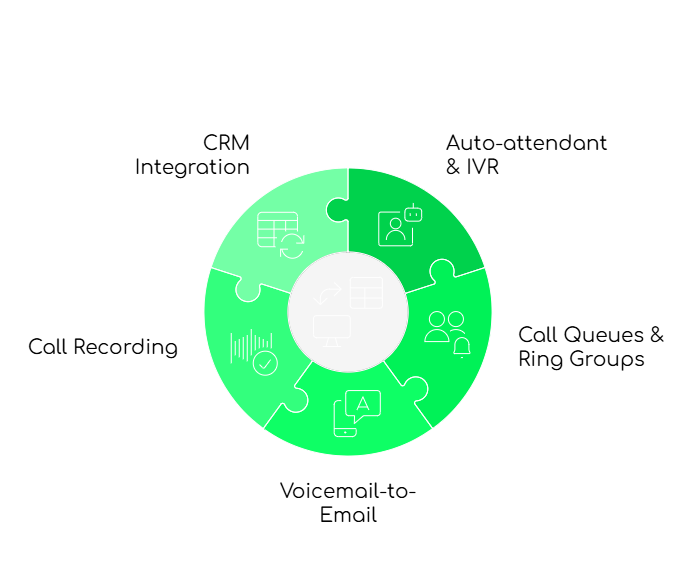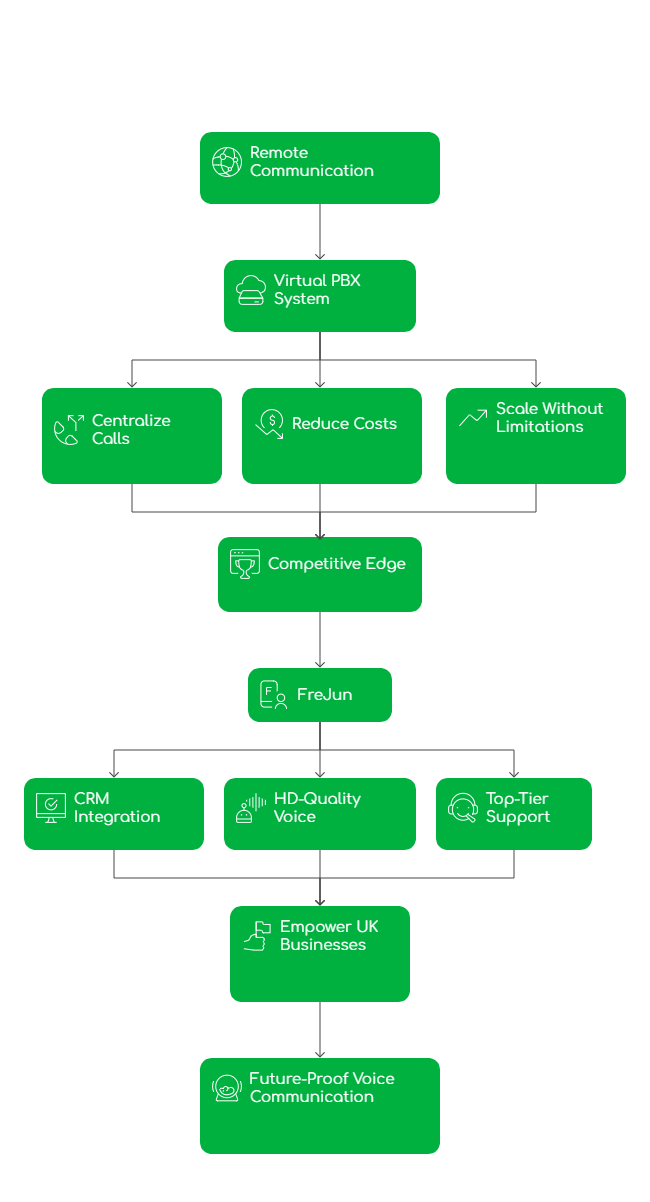How can businesses ensure seamless collaboration when their employees work from different locations? In today’s evolving work environment, where hybrid and remote work are becoming the norm in the United Kingdom, companies must proactively rethink how they manage calls, team coordination, and customer interactions. Unfortunately, traditional phone systems are no longer sufficient for today’s flexible work culture. This is where virtual PBX systems come into play — offering a scalable, cloud-based alternative that keeps teams connected no matter where they are. By centralizing call management and providing tools like call routing, voicemail-to-email, and mobile app access, businesses can effectively ensure smooth communication across departments and time zones. Ultimately, this shift empowers organizations to maintain productivity, responsiveness, and collaboration in a distributed workforce.
Remote Team Communication has evolved from being a temporary fix to a long-term necessity. With a virtual PBX, calls can be routed based on availability, departments, or working hours, ensuring no opportunities or queries are missed. Employees working from home, in the field, or across regional offices can all access the same features and communication quality as those at headquarters. For UK businesses, this shift is more than a tech upgrade; it’s a strategic move that improves customer service, enhances internal collaboration, and supports business continuity in an increasingly mobile and digital economy.
Table of contents
Why Remote Teams Need Virtual PBX?
Remote work is no longer a trend; it’s the standard for many UK companies. To remain competitive and connected, businesses must enable seamless voice communication for teams working across cities, regions, or time zones. Remote Team Communication is now a core part of business infrastructure, and Virtual PBX systems provide the cloud-based foundation to make it efficient and scalable.

Instead of relying on traditional landlines or outdated PBX hardware, employees can now use laptops or smartphones to handle business calls from anywhere. As a result, they gain greater flexibility and mobility without compromising professionalism. Meanwhile, managers benefit from full visibility into team activity, ensuring a smooth customer experience and consistent service — no matter where the agent is located. Furthermore, platforms like FreJun enhance this experience by offering real-time analytics, CRM integration, and UK-optimized voice quality. Together, these features make communication not only easier but also smarter, more efficient, and tailored for modern business needs.
This shift empowers businesses to stay agile and responsive in a fast-changing environment. With FreJun’s virtual PBX solution, UK companies can embrace flexible work setups without compromising on professionalism, performance, or customer satisfaction.
UK-Specific Benefits of Virtual PBX
In the United Kingdom, businesses face unique communication demands, such as supporting remote employees across multiple regions, maintaining local caller presence, and complying with strict GDPR. Ensuring smooth, secure, and efficient Remote Team Communication is crucial for success in today’s distributed work environments. That’s where Virtual PBX systems prove invaluable, offering a cloud-based infrastructure built to handle geographic and regulatory complexity.

FreJun stands out as a provider tailored specifically to these UK business needs. It offers UK-based virtual numbers, allowing teams to project a consistent local identity when engaging with clients. The platform is fully compliant with UK data privacy laws and integrates seamlessly with popular tools like Zoho, HubSpot, and Salesforce. With low-latency call routing, region-specific infrastructure, and responsive customer support, FreJun ensures that UK companies enjoy exceptional call quality, operational efficiency, and peace of mind.
Business Advantages of Virtual PBX Solutions
Virtual PBX platforms deliver measurable advantages for modern businesses, especially when prioritizing Remote Team Communication. These cloud-based systems are designed to support agility, reduce complexity, and enhance collaboration across distributed teams. Below are key benefits explained in more detail:
- Scalability: Easily add or remove users as your business expands, without the need for reconfiguring physical systems or purchasing new hardware.
- Cost Savings: Eliminate expensive phone lines, PBX servers, and maintenance contracts. Virtual PBX solutions offer predictable, subscription-based pricing with minimal upfront costs.
- Remote Access: Empower employees to make and receive business calls from any internet-connected device, whether it’s a laptop, smartphone, or tablet, ensuring consistent communication regardless of location.

- Workflow Integration: Seamlessly connect with tools like CRM software, helpdesk platforms, and team messaging apps, allowing for automated call logging, contextual follow-ups, and improved productivity.
- Real-Time Reporting: Access detailed analytics on call volume, agent performance, wait times, and missed calls. Managers can use this data to optimize staffing and improve customer service across remote teams.
Essential Features for Remote Work

For high-performance remote operations, your Virtual PBX should offer intelligent call routing, mobile and desktop app access, voicemail-to-email with transcription, and real-time call analytics. These features ensure that remote employees can manage calls professionally from anywhere, maintain consistent communication, and never miss important messages. For high-performance remote operations, your Virtual PBX should include the following essential features to support seamless Remote Team Communication:
- Auto-attendant & IVR: Automatically greet callers and direct them to the right department or team member without manual intervention. This enhances professionalism and reduces wait times for both customers and staff.
- Call Queues & Ring Groups: Organize inbound calls efficiently by placing them in smart queues or routing them to multiple team members simultaneously. This helps balance workloads and prevents missed opportunities.
- Voicemail-to-Email: Transcribe or send voicemails directly to your team’s email inboxes, ensuring that no important client message gets lost or delayed—especially useful for remote teams working in different time zones.
- Call Recording: Record conversations for quality monitoring, compliance, and training. Managers can review real calls to improve agent performance and ensure consistent service across distributed teams.
- CRM Integration: Sync your PBX with platforms like Salesforce, HubSpot, or Zoho to automatically log calls, display customer history, and streamline workflows. This reduces manual effort and keeps customer data centralized.
Implementing a Virtual PBX: Step-by-Step
Implementing a virtual PBX is a strategic move for businesses that want to modernize and streamline Remote Team Communication. Whether you’re transitioning from a legacy phone system or starting fresh, following a structured implementation plan ensures smoother adoption and greater long-term success.
1. Assess Your Needs
Start by identifying your team size, call volume, business hours, and collaboration tools. Understanding how and where communication happens helps tailor the system effectively. This foundation avoids over- or under-engineering your setup.
2. Select a Trusted Provider
Choose a provider that supports UK-based numbers, offers GDPR-compliant services, and maintains strong uptime records. The right partner ensures security, reliability, and regional optimization from day one. Prioritize ease of use and responsive support.
3. Set Up Extensions & Routing

Design your call flow to match your team structure using auto-attendants, ring groups, and direct lines. This keeps calls organized and efficient for both staff and clients. Custom routing reduces delays and missed opportunities.
4. Deploy the Platform
Install softphone apps or web-based tools on each team member’s preferred devices. Ensure compatibility across desktops, tablets, and smartphones. Provide basic instructions or training to speed up adoption.
5. Monitor and Optimize
Use built-in analytics and team feedback to track call performance and identify bottlenecks. Adjust call flows, support hours, or training materials as needed. Continuous improvement strengthens user experience and productivity.
Key Takeaways
With powerful features like call routing, CRM integration, and mobile accessibility, they offer a scalable solution for managing calls across distributed teams. By investing in the right tools and providers, companies can strengthen Remote Team Communication, enhance customer service, and stay competitive in today’s fast-paced business environment.

- Virtual PBX systems empower remote and hybrid teams by centralizing communication via the cloud.
- These solutions replace legacy infrastructure with scalable, feature-rich VoIP platforms.
- Providers like FreJun offer intuitive interfaces, CRM integration, and robust support for distributed teams.
A reliable Virtual PBX system is no longer a luxury it’s a necessity for any organization embracing remote or hybrid work. By centralizing communication, automating call handling, and ensuring real-time access across devices, businesses can build stronger internal coordination and deliver exceptional customer experiences. Investing in this technology today lays the foundation for long-term efficiency, agility, and growth.
Final Thoughts
Remote communication is the foundation of modern business. In the UK, where companies must meet local expectations while supporting flexible work, a virtual PBX system is a smart investment. The ability to centralize calls, reduce costs, and scale without limitations gives businesses a competitive edge. FreJun leads the way among Virtual Phone Providers by combining powerful features with local optimization. From seamless CRM integration to HD-quality voice and top-tier support, FreJun empowers UK businesses to run smarter and communicate better, no matter where their teams are based.

For any organization looking to future-proof its voice communication, FreJun is the clear choice. As the UK business landscape continues to evolve, staying connected with clients and teams regardless of location is more important than ever. A Virtual PBX system backed by a trusted provider like FreJun not only simplifies communication but also aligns with the digital-first mindset driving today’s enterprises. With FreJun’s reliability, advanced automation, and easy scalability, companies can focus on growth while maintaining seamless, professional communication across all channels.
Further Readings – 02 Number UAE: Abu Dhabi Area Code Complete Guide
FAQs
FreJun offers UK-based virtual numbers, allowing employees to place calls with a professional, location-appropriate caller ID regardless of where they’re working from.
FreJun integrates with major CRM platforms like Salesforce and HubSpot to capture call data, notes, and customer history instantly no manual input required.
FreJun provides guided onboarding, video walkthroughs, and real-time chat support to ensure every user starts confidently and quickly.
FreJun delivers real-time analytics, detailed call logs, and custom dashboards so leaders can evaluate productivity, call outcomes, and service quality at any time.
FreJun’s infrastructure is designed for UK businesses, with reliable high-definition audio, local server routing, and minimal call latency nationwide.
